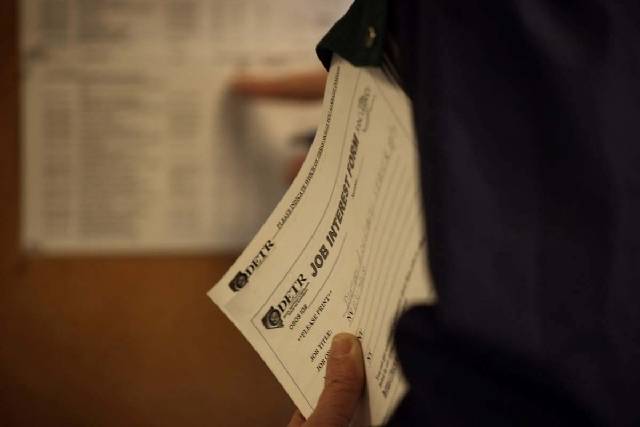Nevadans must accept job offer or risk losing unemployment pay
The phone rang every day, but anxiety prevented an answer.
D’Ahna Mitchell, 21, knew who was on the other end and what they were calling about, but fear of contracting the coronavirus kept her from picking up. It would be about a week before she did.
The retail shop where she worked part time had opened up, and Mitchell’s boss was asking her to return to work.
“The last thing I wanted to do was go in,” Mitchell said. “I was just trying to put it off as much as I could.”
Mitchell accepted her return to work once she learned she could risk losing her unemployment benefits — the reward for her many phone calls to the Department of Employment, Training and Rehabilitation — if she said no.
Nevada is among several states in which people cannot continue receiving unemployment benefits if they’ve turned down a suitable job offer.
Federal guidelines
The U.S. Department of Labor allows flexible guidelines to states on who can qualify for unemployment insurance benefits under the CARES Act, particularly when it comes to the work search requirement, which Nevada has indefinitely waived.
However, DETR spokeswoman Rosa Mendez said, the federal guidelines are clear and rigid on accepting work: “no such flexibility was given for refusal of suitable work.”
“You must be willing to accept and claim employment if asked to go back to work,” DETR Director Heather Korbulic recently said of pandemic unemployment assistance claimants — those who are self-employed or independent contractors — though it also applies to traditional filers. “You will not receive any additional benefits if you refuse the offer.”
Fear alone isn’t enough to refuse work, according to labor department guidelines.
Nevadans who refuse work are likely to need a sick note. Those deemed to have refused work without one run the risk of an employer contacting DETR.
Employers are federally mandated to contact DETR if an employee turns down work, Mendez said.
There are exceptions for people with COVID-19, or people who have a family member or someone in the household with the disease, as well as for people who have child care issues or other COVID-19-specific issues under the CARES Act, Mendez said. Those people would probably qualify for unemployment benefits under the same program as those who are self-employed and independent contractors.
Elsewhere
Several states, including South Carolina and Alabama, have also told workers they cannot receive unemployment benefits if they’ve turned down a suitable job offer.
However, some states such as Colorado and California provide a little more wiggle room.
In California, those with compromised immune systems, serious chronic health problems such as heart disease, lung disease or diabetes or who are over age 65 are considered at higher risk and can refuse work, according to the state’s Employment Development Department.
Online guidelines indicate a worker has “good cause” not to return to work and remains eligible for unemployment benefits if their job isn’t an essential service and within a reopening industry.
The state agency also considers a job offering less money than the prevailing wage reason enough to not return to work and continue receiving benefits.
Some states “will be liberal about it” and recognize the risk of catching COVID-19 may be legitimate grounds to stay home without losing unemployment benefits, according to Gary Burtless, an economist with the Brookings Institution, a Washington, D.C.-based think tank.
“Who knows if it’s safe enough to go back?” Burtless posed.
That concern kept Mitchell from immediately returning to one of her part-time jobs.
She’s been back at work for a couple of weeks now, and she credits her employer with implementing strong sanitation and protection procedures, such as plexiglass barriers at the register and separate hand-sanitizer bottles for employees and customers.
“They’re doing a lot, and I truly appreciate it,” Mitchell said.
Still, the fear lingers. Mitchell has a family to support and rent to pay, so there’s little choice but to put her mask on and keep working.
“I pray and I hope that nothing happens,” she said.
Contact Mike Shoro at mshoro@reviewjournal.com or 702-387-5290. Follow @mike_shoro on Twitter.























